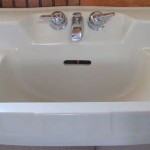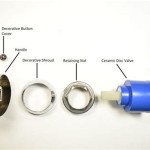How To Fix A Bathroom Sink Faucet: Essential Aspects
A functional bathroom sink faucet is crucial for daily routines and overall comfort. When faced with a faulty faucet, it's essential to understand the key aspects to consider for an effective repair. This article explores these aspects, providing guidance on identifying the issue and implementing a successful fix.
Identifying the Problem:
Before attempting any repair, accurately identifying the problem is paramount. Common issues include leaks, drips, low water pressure, and difficulty in turning the handles. Observe the faucet's behavior and listen for unusual sounds that may indicate the source of the problem.
Gathering Necessary Tools:
Depending on the type of faucet and the extent of the issue, certain tools may be required. A basic toolkit typically includes adjustable wrenches, pliers, screwdrivers, and replacement parts if necessary. Refer to the faucet's manufacturer's instructions for specific tool requirements.
Shutting Off Water Supply:
Safety is a priority when working with plumbing. Before proceeding, locate the water supply valves under the sink and shut off both the hot and cold water lines to prevent water damage during repairs.
Replacing Worn-Out Parts:
In some cases, worn-out parts may be the culprit. Common replacement parts include washers, O-rings, cartridges, and aerators. Carefully remove the faulty part and replace it with a new one, ensuring a snug fit to prevent leaks.
Adjusting Loose Fixtures:
Loose fixtures can cause leaks or difficulty in operating the faucet. Use an adjustable wrench to tighten the nuts securing the handles and spout to the base of the faucet. Avoid overtightening, as this can damage the fixtures.
Cleaning Clogged Aerators:
A clogged aerator can restrict water flow, leading to low pressure. Remove the aerator using a wrench or your fingers and clean it thoroughly with vinegar or a descaling solution. Reinstall the aerator once cleaned to restore normal water pressure.
Lubricating Moving Parts:
Over time, moving parts within the faucet can become stiff and cause difficulty in operation. Apply a small amount of plumber's grease or silicone lubricant to the moving parts to reduce friction and improve functionality.
Conclusion:
By considering these essential aspects, you can effectively diagnose and repair a leaky or malfunctioning bathroom sink faucet. Whether it's replacing worn-out parts, tightening loose fixtures, cleaning clogged aerators, or lubricating moving components, a systematic approach and attention to detail will ensure a successful fix, restoring your bathroom faucet to its optimal functionality.

Diy How To Replace A Bathroom Sink Faucet Remove Install

How To Replace A Bathroom Faucet Home Repair Tutor

How Do I Replace Bathroom Sink Faucet Handles Cleaning More

How To Remove And Install A Bathroom Faucet

How To Replace Your Bathroom Faucet Plumbcraft Series With Penny

Replacing A Bathroom Faucet Fine Homebuilding

How To Remove And Install A Bathroom Faucet

How To Fix Loose Sink Faucet

How To Remove And Install A Bathroom Faucet

Bathroom Faucet Replacement For Beginners Making Maanita
Related Posts







